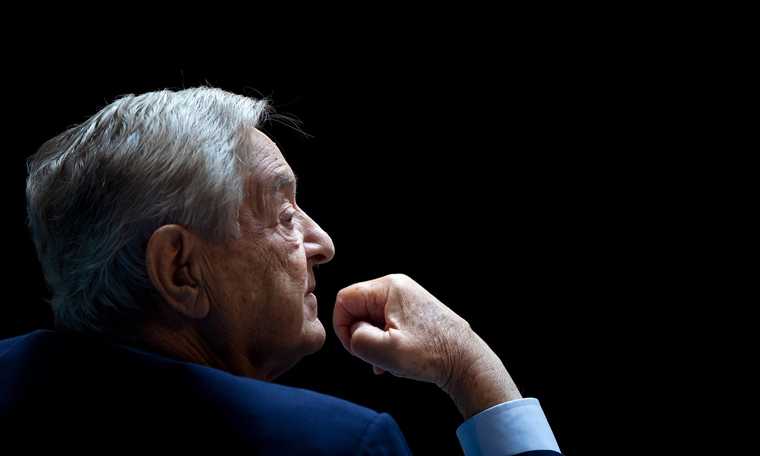In the first part of our series, we presented the past of George Soros, which haunts him to this day. In the second part, we demonstrate that George Soros has never had the courage to run in a single election, not even for a local trade union post. Thus, no-one knows if he would ever have been chosen to perform any function. Instead of being democratically elected, he has bought his way into politics, the V4 news agency reports.
In recent decades, George Soros has amassed billions of dollars through financial speculations, and uses most of his money through his foundations to buy influence in politics. Moreover, he silences counter-opinions.
George Soros’s Open Society Foundations have supported hundreds of organisations across the world for decades to represent the interests of Soros’s empire. These are seemingly non-governmental organisations which – like their boss – intervene in politics without ever having been elected by anyone. These organisations can exert an impact on a country’s political life whenever Soros needs their help.
How can Soros gain influence without having to test his support in an election? It is no secret that the businessman is one of the major donors of the Democratic Party in the United States. In the run-up to the 2016 elections which ended with Hillary Clinton’s downfall, he spent over 25 million dollars on supporting Democratic candidates, an amount tripled this year. According to the database of the US Federal Election Commission, Democracy PAC – a so-called political action committee set up by George Soros which pools and distributes campaign funds – earned 77.7 million dollars in revenue. Out of this amount, the Democracy PAC has allocated 73.3 million dollars to various organisations. Expenditures include grants to candidates, bank charges and legal counselling.
Data shows that George Soros has personally donated 5.6 million dollars to Democracy PAC, while an organisation called Fund For Policy Reform has transferred an additional 46 million dollars. This organisation was also established by the stock market speculator ten years ago with a starting fund of 100 million dollars.
George Soros also maintains good relations with numerous politicians in Europe, including country leaders, members of the European Commission, and MEPs as his allies. During the European Parliament’s previous term, a list was leaked, enumerating several hundred MEPs who were judged by Soros’s network as reliable allies.
Thus, the billionaire influences politics through his money and organisations, without ever having been elected to perform such a function. He has never received a mandate since he has never had to test his support in an election and face what he fears – the option of political failure.
In an article about George Soros, the Financial Times highlights that he is the standard bearer of liberal democracy and open society, committed to openness, media freedom and human rights.
In contrast, the businessman’s reach also influences the press, with views diverging from the liberal mainstream regularly banned from or simply omitted in Soros-funded media outlets. Countless examples of the phenomenon have occurred in recent years, with many coming to light already this year.
This past summer, NYT editorial page editor James Bennet was forced to resign. At the same time, Jim Dao, the deputy editorial page editor, was reassigned to a position in the newsroom.
The columnist was forced out for publishing an op-ed article by Arkansas Republican senator Tom Cotton, on a series of Black Lives Matter demonstrations that shook the United States. In his piece titled Send In the Troops, Cotton argued that violent protesters should be subdued, if need be by deploying troops.
George Soros has a vested interest in the paper. In 2018, one of his investment agencies, Soros Fund Management LLC, bought NYT shares worth more than 3 million dollars.
However, this was the second major scandal tarnishing the patina of the NYT in a matter of months.
A few months ago, the paper wrote about sexual harassment allegations brought against Joe Biden, but quickly exercised self-censorship after pressure from Biden’s staff. At the time, Fox News also reported that the US presidential candidate’s staff pressured the NYT into editing its piece. According to the TV channel, the paper corrected its article on accusations of sexual assault at the request of the Biden campaign.
In November, George Soros published an article on the Project Syndicate portal, in which he gave advice to the leaders of the EU and in which he also explicitly attacked Poland and Hungary, urging the EU to penalise both countries. Hungarian Prime Minister Viktor Orban gave a written response, which was not published on the portal widely considered Soros’s mouthpiece. For years, the Project Syndicate has regularly published the stock market speculator’s writings but seems to censor counter-opinions.
Soros is thus practically inviolable. He is not available for open debate, yet he influences politics and public opinion through the network he has built. The billionaire hides behind the organisations and media outlets he finances.
However, Soros seems to be taking cover not just behind his organisations, but behind actual walls.
In early 2019, one debate in the United States centred on the fence to be built on the Mexican border to stop illegal migration. Naturally, Mr Soros, a staunch proponent of migration, opposed the construction of the fence. However, journalists found that the billionaire was less vehemently against fences when they involve his own assets.
Soros’s New York estate is surrounded by a several-meter concrete fence under the watchful eye of cameras and private security service.





Comments are closed for this post.